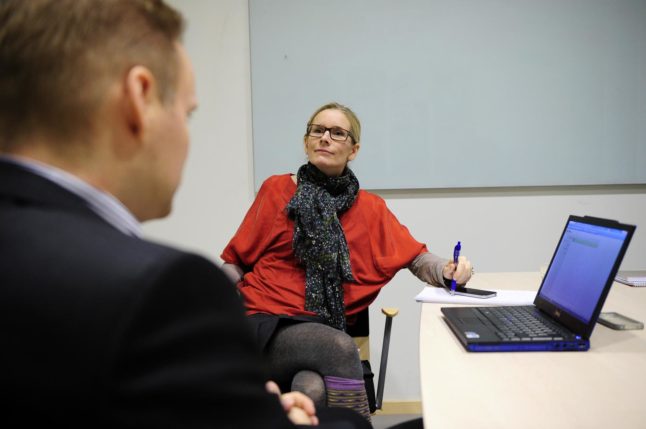ob1. 'Don't try to blend in all the time. Try to stick out, it makes a difference in Sweden'
Erik Gatenholm, a Swedish-American living between Gothenburg and Boston, co-founded a bioprinting firm.
When a startup goes from being founded to being listed on Nasdaq within a year, it's a sign of something good.
“If you have something good going you have to stick to it, not lose yourself in the moment and think you've made it,” Gatenholm notes while reflecting on the rapid rise of his company. Click here to continue reading
2. 'Every day since I came to Sweden feels like a dream'
Ahmad Matar, from Gaza, makes a living from parkour in Gothenburg.

Photo: Nicola Molly McQuistion
Matar is in the middle of a parkour event in his new home Gothenburg when The Local calls. It's rare that a day goes by without him training – so high are the demands put on his body.
“You have to keep practicing all the time, otherwise you lose your conditioning. Your body can't pull it off. I'm always training, every day. If I have to stop for two weeks or so because of an injury to my foot for example I'll just do training that doesn't involve my feet. I never stop,” he explained. Click here to continue reading
3. 'When I came to Malmö I didn't want to go anywhere else'
Abbey Waldron from the UK is a particle physicist in Malmö.
Computer science is growing at lightning speed, with some of the largest strides in recent years being taken in the fields of artificial intelligence (AI) and machine learning. But the challenge is to make sure that all tech entrepreneurs, researchers and innovators are able to keep up with and benefit from the breakthroughs.
“I think if there are things in the world holding science back, this is one of them: making sure that people who are doing research have the right skills,” Malmö-based particle physicist Abbey Waldron emphasizes. Click here to continue reading
4. 'Classical music attracts everyone, even gangsters'
Justina Auskelyte from Lithuania is a violinist in Malmö.
Justina Auskelyte is Malmö's Violinist on a Bike. Not that such a job ever existed – but the Lithuanian created it, and the city seems to love it. She moved to Sweden for love. Marriage, residency permit, permanent job, and creative projects – all this happened in less than a year.
Violinist on a Bike is her most recent idea and she's surprised how quickly the word spread. A week into the project, she met people who were already informed about it.
“I'm not a street musician. People tried to give me money and I had to explain that was not the point,” Auskelyte says, explaining that the concept is an alternative project to bring live classical music as close as possible to the people. Click here to continue reading
5. 'In Sweden I discovered a new country and rediscovered my own'
Simone Coppo is an Italian actor who has worked in Gothenburg and starred in one of Sweden's biggest TV series.
“Let's start at the beginning of the adventure,” says actor Simone Coppo, speaking to The Local from his Rome apartment to discuss his role in the hugely successful Swedish drama Vår tid är nu.
Known as The Restaurant in English, the post-war drama has been phenomenally successful in Sweden, with more than two million viewers watching the tale of a Stockholm restaurant and the intrigues that take place among the family that run it and the staff in the kitchen.
Coppo's character Angelo is a new addition to the second series, currently showing on Mondays on SVT. One of a group of Italian immigrants who work in the kitchen, he faces discrimination and exploitation as a foreign worker while trying to work his way up the restaurant hierarchy. Click here to continue reading
6. 'I find comfort in Swedish culture, because I know it so well'
Safete Binaku, from Kosovo, is an IT consultant and co-founder of a non-profit in Stockholm.
“Wherever I go, I always come back to Sweden,” says IT consultant and non-profit co-founder Safete Binaku.
Her first journey here wasn't an easy one. Binaku's family were among roughly one million Kosovo Albanians who fled or were driven out of the country during the Kosovo War in the late 1990s.
“A few days after we left, in the spring of 1998, the entire area where I lived was burned down,” Binaku says. They headed to Sweden, but the only thing the 13-year-old knew about the Scandinavian country was that her uncle lived there, having left their homeland already. Click here to continue reading
7. How falling ill inspired this Canadian's start-up in Sweden
Denise Fernandes, from Canada, founded a medical startup in Stockholm.
For Denise Fernandes, it was the less-than-happy experience of falling victim to Sweden's notorious vinterkräksjuka [norovirus] that led to her setting up her own business in Stockholm.
Despite having lived internationally between homes in Canada, the USA and the UK before moving to Sweden, she was unprepared for the onslaught of the seasonal illness.
“I had absolutely no warning!” she laughs. “My husband – who is Swedish – hadn't told me about vinterkräksjuka. So, when my whole family became ill, it took me completely by surprise. The illness is famous here. Now that I've been here longer, I've had people give me their stories unprompted – they're almost like war stories.” Click here to continue reading
For more stories of internationals working in Sweden, read the rest of our My Swedish Career series HERE.
Inspired to seek out a new challenge? Browse thousands of English-language jobs in Sweden









 Please whitelist us to continue reading.
Please whitelist us to continue reading.
Member comments